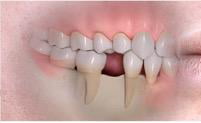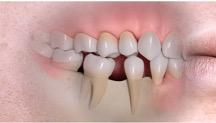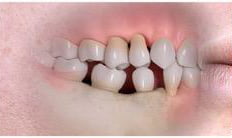- 11 Queen's Road
- Buckhurst Hill
- Essex
- IG9 5BZ
A dental implant is a small titanium screw that is placed underneath the gum and into the underlying jawbone to replace the roots of the missing teeth. Dental implants are used as fixed anchors to support the replacement teeth. They can be used to replace a single missing tooth, to support bridges where several teeth are missing, and to support removable dentures and full mouth bridges when all of the teeth are missing.
A dental implant is regarded as the ideal tooth replacement option when a tooth is missing or when it is too damaged to repair.
To be done correctly and to a high standard, dental implant treatment requires meticulous planning and careful execution. Dental implant treatment has to be much more precise than other forms of dental treatment. As the implants are fixed and fused to the jawbone there is very little margin for error and so we use even more precise engineering than that used in Formula One.
Principal dentist Jonathon Brown, in addition to being a general and oral surgery dentist, is also The Queens Dental Practice implantologist.
Jonathon, who worked as an oral surgeon at Guy’s Hospital from 2010-2019, has a Postgraduate Diploma in Implant Dentistry from the internationally acclaimed Eastman Dental Institute. Jonathon is also an educational supervisor and supports and mentors newly qualified dentists to ensure that they are safe to work as an NHS dentist.
The advantages of dental implants are that they look and feel like your natural teeth and that that they preserve the underlying jawbone and prevent it from shrinking over time. Unlike dentures you don’t need to take them out at night, so you don’t need to worry about your partner or family seeing you with missing teeth. Because they are fixed, you also don’t have to worry about them slipping and moving when you eat and talk so you can feel confident eating and talking in front of people. Compared with a bridge, dental implants preserve the jawbone and don’t require the neighbouring teeth to be filed down so you are more likely to retain your remaining natural teeth.
There are other forms of tooth replacement, and there may be circumstances in which other forms of tooth replacement may be more suitable, such as dentures or bridges, depending on the individual patient. We will always explore the options in consultation with you to ensure that we recommend the most appropriate solution.
We normally recommend that dental implants are placed after some healing of the extraction socket from the natural tooth removal has occurred – generally about 2-3 months after the tooth has been extracted.
Once the extraction socket has healed, there is an initial consultation to assess if you are suitable for dental implants and to discuss your expectations and answer any questions you may have about the treatment.
Once it is decided that you are a suitable candidate, you will need to have a full implant assessment to plan the treatment. The assessment includes a 3D scan of your jawbone, impressions or a scan of your teeth, X-rays and an assessment of your gum health.
At The Queens Dental Practice, we use state-of-the-art 3D digital software to create a treatment plan that is safe, predictable and precise. We then go through the treatment plan with you and answer any questions before you decide if you wish to proceed with the treatment.
Only when you are completely happy will we proceed to booking an appointment for surgery to insert the implants.
A small operation is performed under local anaesthetic to place the implants within the jawbone. Once the implant has been placed it is then left to heal and fuse to the jawbone. This can take from 3-6 months depending on factors such as whether we need to build up the bone level and the stability of the implant when it is inserted.
When the implant has fused to the surrounding bone, the process of making a crown or bridge to replace the missing tooth or teeth begins. An impression or mould is taken and sent to a specialist dental implant laboratory to create a custom-made crown or bridge.
Two weeks later, when it has arrived from the laboratory, the replacement teeth or bridge is fitted.
It can take from 4-12 months and requires around 8-10 appointments.
No. You are given a local anaesthetic and will be completely numb during the procedure. Afterwards, there will be some swelling and discomfort once the local anaesthetic from the injection has worn off. This is easily managed with over the counter pain killers such as paracetamol and ibuprofen.
Where there is bone loss, we may need to carry out an additional bone grafting procedure to build up the bone. Bone grafting is a safe, predictable and commonly used procedure. Most implant cases need some form of bone grafting to make sure that the implant is encased in bone and the final result looks as natural as possible.
It is rare that someone would be too old. We place implants for patients in their 70s and 80s and it can be argued that implants are preferable to other forms of tooth replacement because they are easier to maintain compared to a denture or bridge.
The ideal time to have dental implants is 2-4 months after the tooth has been removed. In certain situations, it may be possible to place the implant immediately into the extraction socket after the tooth has been removed.
If you decide to leave the gap from a missing or extracted tooth, the teeth either side of the gap may tip into the space and the tooth above can grow downwards into the gap. This can cause food to get trapped in between the teeth and in the gap when eating. The other issue with leaving the gap is that the underlying jawbone in the area of the missing tooth will resorb or shrink and will become narrower over time. This means you are more likely to require additional bone grafting if you decide to replace the tooth with an implant at a later date.



Most patients can have dental implants, as there are only a few conditions that prevent successful treatment. Implants may not be recommended for patients who have had radiotherapy to their jaw or neck for the treatment of cancer, patients with poorly controlled diabetes, or patients who have had intravenous bisphosphonate treatment.
Smoking is also an important consideration – we know that smoking increases the risk of the implant not fusing to the bone and it reduces the healing capacity of the tissues and jawbone. We therefore recommend that patients stop smoking – preferably permanently – but at least for a period before and after the placement of the implant.
One issue can be the development of gum disease around dental implants. For this reason, at The Queens Dental Practice, we ensure that patients have healthy gums and are able to look after their implants after the treatment has been completed.
At the Queens Dental Practice, we use the Straumann implant system and components for our implant restorations. Straumann are a Swiss company and are one of the largest and most reputable implant manufacturers in the world. They are renowned for innovation as well as products that are made with the highest levels of precision. Our implant crowns are also made bespoke for each patient from components that are individually customized by a specialist dental implant laboratory.
It is possible to have cheaper dental implant treatment abroad, sometimes significantly so. If the treatment goes well, you can therefore make significant savings. However, if you encounter complications and problems, it can end up being more expensive and very distressing.
If you are considering having dental implant treatment abroad there are several things you should consider: